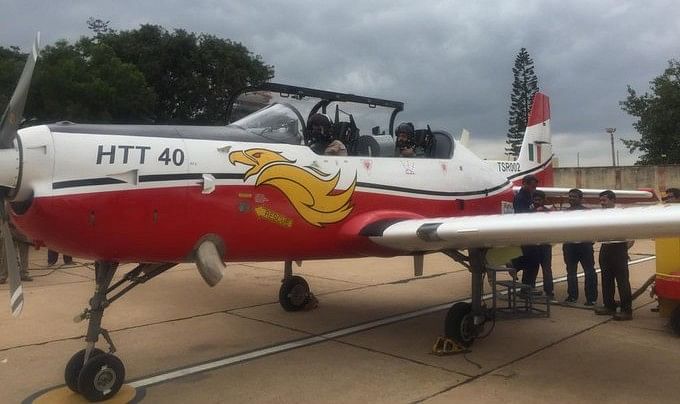New Delhi: The Defence Ministry Tuesday cleared the purchase of 106 basic trainer aircraft — HTT-40 — from state-owned Hindustan Aeronautics Limited (HAL) after the Indian Air Force strongly backed the indigenous project and scrapped plans to buy any more of the scam-tainted trainer aircraft from Swiss firm Pilatus.
The HAL acquisition was among projects worth Rs 8,722.38 crore cleared by the Defence Acquisition Council (DAC), chaired by Defence Minister Rajnath Singh, Tuesday. These included “approvals that are likely to speed up the procurement of AK-203 (rifles) and Unmanned Aerial Vehicle upgrades”, which will involve arming the Israeli systems currently used by India.
“With Hindustan Aeronautics Limited (HAL) having successfully developed Basic Trainer Aircraft (HTT-40) prototypes and certification process underway, the DAC approved procurement of 106 basic trainer aircraft from HAL to address the basic training requirements of the Indian Air Force (IAF),” the ministry said in a statement.
Once they are certified, 70 Basic Trainer Aircraft will initially be procured from HAL, the ministry added. The remaining 36 will be procured after the HTT-40 fleet in the IAF is operationalised.
Air Chief Marshal Rakesh Bhadauria had, in October last year, made it clear that the IAF will go in for HTT-40, adding that the order for 38 more Pilatus had been cancelled.
In January 2016, the DAC had approved the procurement of 38 PC-7 Mk-II trainers from the Swiss company as the IAF claimed they were in dire need of the trainers and the HTT-40 was not yet ready.
The Comptroller & Auditor General (CAG) had last year flagged the Rs 2,895.63 crore contract for 75 Pilatus PC-7 Mk-I basic trainer aircraft, signed in 2012, citing incorrect price calculations that allegedly worked in the firm’s favour.
Alleged arms dealer Sanjay Bhandari, who is said to have had close links with Congress leaders as well as businessman Robert Vadra, former party chief Rahul Gandhi’s brother-in-law, was an agent of the Swiss firm.
The Pilatus deal had been under the CBI’s scanner since it was flagged by the defence ministry during the tenure of the late Manohar Parrikar, from 2014-2017.
Also Read: HAL needs new orders to prevent complete halt of production after 2021-22
UAVs to be upgraded
The HTT-40 qualifies as “Indian designed, developed and manufactured (IDDM)” equipment, a category introduced in the Defence Procurement Policy 2016. The aircraft, which has been in the works for the last seven years, has cleared all Air Staff Qualitative Requirements (ASQRs).
In November last year, Air Chief Marshal Bhadauria had taken a full one-hour sortie in the HTT-40 as a mark of confidence in the aircraft.
The other approvals issued Tuesday include those that are likely to speed up the procurement of AK-203 assault rifles, and Unmanned Aerial Vehicle (UAV) upgrades.
The mega-deal for the AK-203, under the Make in India initiative, was finally inked last year. This will be a much-awaited order for the armed forces, which have been struggling to replace their INSAS rifles for over two decades.
When the deal was first announced in 2018, there was a lot of excitement. However, the deal continues to be a work in progress. The delay has forced the Army to order SiG-716 rifles from the US under a fast-tracked process to arm its frontline troops.
With 72,000 SiG rifles already delivered, the Army is now pursuing emergency procurement of another 72,000.
The Indo-Russia Rifles Private Limited, a partnership between the Ordnance Factory Board (OFB), the Kalashnikov Concern, and Rosoboronexport (the Russian state agency for military exports), have failed to arrive at an offer price for the AK-203 rifle.
It was expected that the price of each rifle would be around $1,100 (approx. Rs 82,000), but it has risen due to a number of issues. The defence ministry has constituted a committee to break this logjam.
Another important project that has been given clearance is the deal for upgrading the UAVs in India’s inventory. According to the plan, the Israeli Heron UAVs are supposed to be upgraded with laser-guided bombs, precision-guided munitions, and anti-tank missiles.
The forces are also proposing to equip the drones with better surveillance and reconnaissance capabilities. This is part of a project that has got a sudden push due to the ongoing tensions at the Line of Actual Control.
Also read: CAG report pokes holes in UPA-era deal for Pilatus trainer aircraft for IAF
